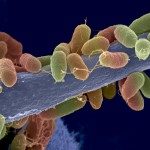Lien vers Pubmed [PMID] – 18644959
Antimicrob. Agents Chemother. 2008 Oct;52(10):3504-11
Two clinical isolates of Aspergillus fumigatus, designated AT and DK, were recently obtained from patients failing caspofungin and itraconazole therapy, respectively. The isolates were tested by microdilution for susceptibility to itraconazole, voriconazole, posaconazole, ravuconazole, and caspofungin and by Etest for susceptibility to amphotericin B and caspofungin. Susceptibility testing documented that the DK isolate was azole resistant (itraconazole and posaconazole MICs, >4 microg/ml; voriconazole MIC, 2 microg/ml; ravuconazole MIC, 4 microg/ml), and the resistance was confirmed in a hematogenous mouse model, with mortality and the galactomannan index as the primary and secondary end points. Sequencing of the cyp51A gene revealed the M220K mutation, conferring multiazole resistance. The Etest, but not microdilution, suggested that the AT isolate was resistant to caspofungin (MIC, >32 microg/ml). In the animal model, this isolate showed reduced susceptibility to caspofungin. Sequencing of the FKS1 gene revealed no mutations; the enzyme retained full sensitivity in vitro; and investigation of the polysaccharide composition showed that the beta-(1,3)-glucan proportion was unchanged. However, gene expression profiling by Northern blotting and real-time PCR demonstrated that the FKS gene was expressed at a higher level in the AT isolate than in the susceptible control isolate. To our knowledge, this is the first report to document the presence of multiazole-resistant clinical isolates in Denmark and to demonstrate reduced susceptibility to caspofungin in a clinical A. fumigatus isolate with increased expression of the FKS gene. Further research to determine the prevalence of resistance in A. fumigatus worldwide, and to develop easier and reliable tools for the identification of such isolates in routine laboratories, is warranted.

